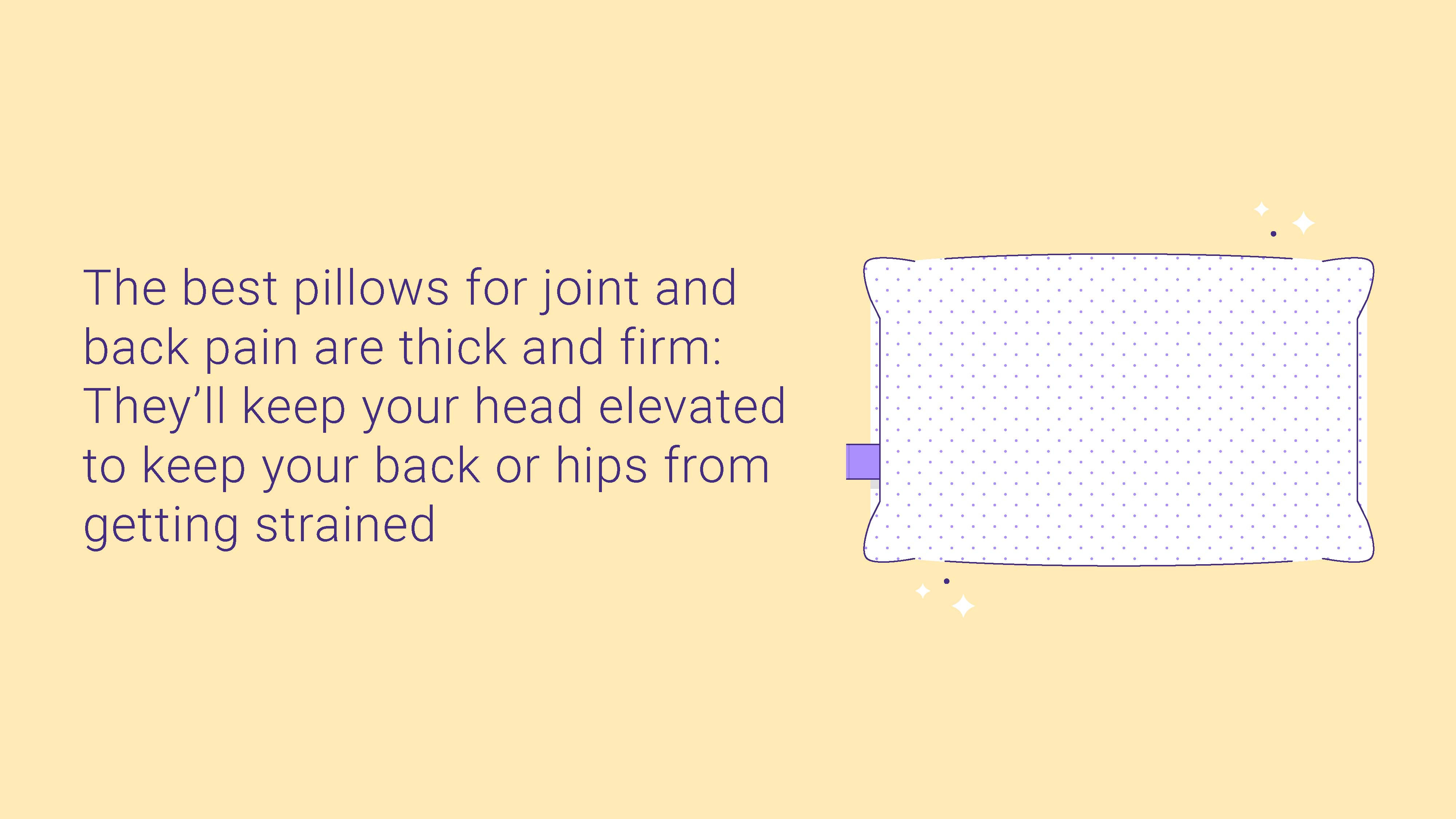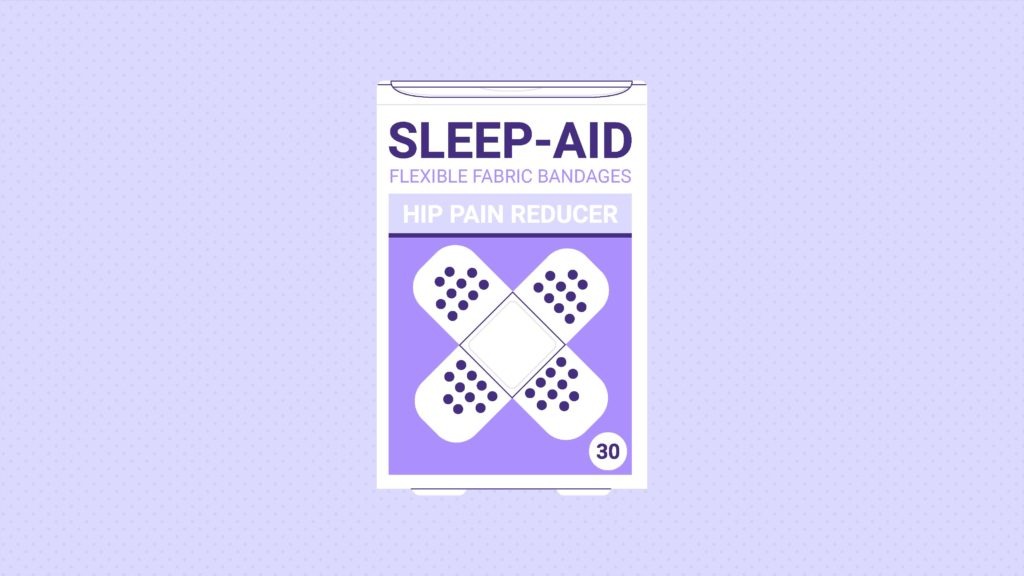Hip discomfort doesn’t always start from sleeping in a certain position, or even sleeping on the wrong mattress or a mattress that’s worn out. But very often, your sleep situation can make a hip issue significantly worse.
Laying the wrong way can put you at risk for putting extra pressure on a sensitive hip or throwing your hips out of their natural alignment—which can both make it hard to sleep comfortably and get the rest you need. Same goes for snoozing on a mattress that doesn’t adequately conform to your body’s curves or even laying on a pillow that doesn’t properly support your neck and spine.
So if you’ve been using over-the-counter pain relievers or anti-inflammatory meds to get good sleep, it might be time to take action. But what kinds of sleeping positions could be hurting your hips—and what can you do to sleep more soundly? Here’s a look at some of the most common culprits, plus easy changes that can lead to serious pain relief.
How Can Sleep Positions Cause Hip Pain?
There are many different causes of hip pain. Sometimes the culprit is an injury like bursitis, a dislocation, a fracture, a tear, a sprain, or tendinitis. It could also stem from arthritis or a condition like sciatica (where the sciatic nerve is pinched).
But no matter the cause, pain in the joints—including the hip joint or hip bone—tends to flare up when we’re laying in bed. Spending time in the same position for hours and hours can cause fluid to accumulate in the joints, which can lead to swelling and stiffness. If you happen to be in a less-than-optimal position, you might put added pressure on your sore hip or cause your hips to get thrown out of their natural alignment. And both of those things can make existing nighttime pain a lot worse.
What Happens When Hip Pain Disrupts Your Sleep?
Hip soreness that flares up at night can make it hard to fall asleep or cause you to wake up throughout the night. That can put a major dent in your snooze time. One Arthritis Care Research study found that women with hip osteoarthritis spend about 90 minutes tossing and turning each night. That’s a lot of lost sleep.
Aside from leaving you drowsy the next day, sleep deprivation can actually amplify pain sensations and potentially leave you more uncomfortable. Findings show that the heightened pain can make it tougher to fall asleep the next night, so before long, you might find yourself in a never-ending cycle of less sleep-more pain-less sleep-more pain.
Sleeping Positions to Ease Hip Pain
It’s well known that painful joints—including the hip joints—can often feel their worst at night. Part of the problem has to do with the fact that our joints naturally tend to swell at night when we’re sedentary for long periods. But the position that you sleep in can also have an impact. Wonky snooze postures can throw your hips out of alignment, leaving you stiff and sore when you wake up. But laying in a way that preserves proper alignment can help you sleep more comfortably—and wake up more rested.
So what’s the best sleeping position for problem hips? Ultimately, it’s about finding what feels the best for you. But experts agree that in general, some positions tend to be better than others.
Side Sleeping
Goo news, side sleepers. This is considered one of the best positions for chronic back pain—and it can also do wonders for a bad hip. According to the National Institutes of Health, side sleeping promotes proper spinal alignment, which puts the least amount of pressure on your back, hips, and neck.
The key, of course, is sleeping on the side of your good hip. That keeps pressure from building up on your sore hip throughout the night and triggering discomfort. (If both of your hips bother you, consider alternating sides throughout the night.) And of course, it never hurts to invest in a comfortable mattress for side sleepers. Another tip: Curl your legs into the fetal position and tuck a body pillow between your knees. That’ll encourage proper alignment and take additional pressure off of your hips and back.
Back Sleeping
Snoozing on your back is another sleep posture that many with joint pain find comfortable. Laying flat is a great option for minimizing soreness on your hips, say Cleveland Clinic experts, because it evenly distributes weight so there’s less pressure on your sides.
If back sleeping causes tension in your lower back, there’s a fix for that. Try placing a small pillow underneath your knees to promote your spine’s natural curve and encourage optimal alignment.
Stomach Sleeping
Sorry stomach sleepers: Laying in bed on your belly tends to be the worst way to sleep when you’re dealing with hip discomfort. Spending long bouts on your stomach puts a lot of pressure on the front of your hips, of course. It puts pressure on your back too, by pushing your spine into an unnatural curve and messing up your natural alignment.
It’s best to steer clear of this position if you can. But if you really, really love sleeping on your stomach, you can improve your alignment a little bit by placing a flat pillow under your lower abdomen. If the pillow trick doesn’t seem to be enough to ease your pain, though, it might be worth experimenting with sleeping on your side or your back.
More Smart Sleep Advice for Hip Pain Relief
Switching up your sleep position can go a long way towards helping your hips feel better. But it’s not the only nighttime tactic that can make a difference. A few more ideas worth considering:
Try Gentle Stretches
If stiffness or tightness is your main hip issue, some gentle stretching or low-impact exercise could make it easier to get comfortable once you get into bed. (As well as improve your range of motion when you’re up and about.) Getting into the habit of stretching, too, could improve your mobility and leave you feeling better during the day. A simple kneeling hip-flexor stretch is a great place to start. It’s easy for beginners, says American Council on Exercise, but there are also variations that can increase the stretch’s intensity.
Invest in the Best Mattress
If your bed is more than seven or eight years old, it might be time for an upgrade. As you near the decade mark, even the best mattresses can start to sag and lose the support that initially made them so comfortable. And that can contribute to—or even be a cause of—hip soreness.
When it comes to minimizing pain and pressure, many sleepers agree that memory foam mattresses are the best bet. Memory foam is designed to conform to the body’s natural curves, which can encourage optimal spinal alignment as well as reduce the formation of painful pressure points. If you sleep on an innerspring model and aren’t in the market for a new mattress quite yet, consider adding a little extra cushioning to your sleep situation with a memory foam topper.
As for the firmness level? Everyone has their own preferences, but medium-firm mattresses are generally regarded as the best option for back and joint pain. Very soft mattresses can cause sinking, which can have a negative impact on your alignment. On the other hand, too-hard sleep surfaces are notorious for causing stiffness or pressure points.
Upgrade Your Pillow
Pillows cradle your head to keep your neck and spine properly aligned, which can have an impact on your hips. If you’ve been sleeping on the same old cushions for a while, consider springing for a new set. The best pillows for joint and back pain are thick and firm: They’ll keep your head elevated at the right angle to keep your back or hips from getting strained. Like with mattresses, memory foam pillows tend to be a comfortable, supportive choice. But latex is another good option.

When to Call Your Doctor About Hip Pain
Mild hip discomfort can often be managed at home. But pain that’s severe or accompanied by other symptoms could warrant medical attention. It’s a good idea to call your doctor if your pain lasts for more than three or four days straight or more than two weeks intermittently, or if the pain is so bad that you need sleep medication to get a good night’s rest. You should also let your doctor know if your hip pain is accompanied by weight loss, chills or a fever, night sweats, or if you have a history of cancer, say Cleveland Clinic experts. Your doctor may refer you to a physical therapist or run tests to see if your hip pain is caused by an underlying issue.
Frequently Asked Questions
Why does my hip pain get worse at night?
Side sleepers may experience more severe hip pain when they lay down into bed because they’re putting pressure on the hip joint in the side sleeping position. Also, after a day of moving and being active, once we lay down and relax, we’re more likely to notice the discomfort in our hips. Memory foam mattresses and other pressure-relieving beds can minimize this discomfort, but that’s not enough to completely relieve everybody’s pain. If your discomfort impedes your sleep, we suggest switching to back sleeping until your pain improves.
How do I know if my hip pain is serious?
Hip pain is relatively common, even some more severe hip pains go away in a couple of days without a trip to the doctor. However, if your hip pain becomes drastically worse over a short period, it may be a sign that something more serious needs addressed. We also suggest going to the doctor right away if you’re unable to put weight on your hip or move your hip.
Can walking help hip pain?
Yes, walking is a low-impact exercise that gets your body and hips moving. A lack of physical activity can cause stiffness in the hips, so it’s good to get out and get some exercise. That said, those with hip pain usually want to avoid jogging or jumping because the impact can exacerbate discomfort.
How do you sleep with tight hip flexors?
Those with tight hip flexors usually are most comfortable sleeping on their side with their legs curled up (some people refer to this as the fetal position). You can also get comfortable rest by sleeping on your back with a pillow under your knees.
What are the home remedies for hip pain?
Apart from light exercise, ice, and heat, there aren’t too many home remedies to zap hip pain. Avoid things that may exacerbate pain (e.g., side sleeping, uncomfortable mattresses, high-impact exercise), get good sleep at night, and keep your hips moving. If pain persists, it may be time to talk with a doctor.
The Bottom Line
There are a range of issues that could cause pain in your hip joint. Sometimes your sleeping position could be the culprit—but even if it’s not the root cause, a less-than-ideal posture while snoozing may very well make a sore hip feel even worse.
Changing up your sleep position might not make your hip problems go away completely. But making a switch, along with reevaluating your mattress and your pillows, could certainly make a difference and help you sleep better. And when you get a good night’s rest, you might find that your hip discomfort might feel more manageable overall.
This article is for informational purposes and should not replace advice from your doctor or other medical professional.

Sleeping on my side has significantly improved my nighttime hip pain. However, I also rub on some absorbine jr and do light stretches before going to sleep. Works wonders.